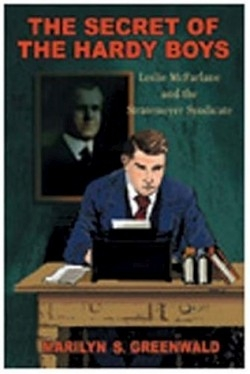
The Secret of the Hardy Boys
Leslie McFarlane and the Stratemeyer Syndicate
Frank and Joe Hardy have been solving mysteries as teenage detectives since 1926. The Hardy Boys books have sold more than fifty million copies, and new stories are being published today. Even the series’ first three books (The Tower Treasure, in which the boys search the tower of a mansion where a crime has been committed; The House on the Cliff, in which the boys hunt for their missing father; and The Secret of the Old Mill, where the boys solve a counterfeiting mystery) can still be enjoyed by new readers.
Of the hundreds of mysteries that the brothers have solved over the years, perhaps the greatest mystery of all surrounded the accredited author of the books, Franklin W. Dixon. For decades, readers did not know that no such person existed—Canadian freelancer Leslie McFarlane was actually writing the books. McFarlane was contractually sworn to secrecy, and years after the secret was out, he felt uncomfortable with the publicity surrounding the “real” author of the beloved books.
Although he is best remembered as the author of the first score or so of the Hardy Boys mysteries, McFarlane never intended to make his mark as a ghostwriter. It took decades for him to realize the significance of the “throwaway” adventure stories he crafted early in his writing career. This fascinating book tells the tale behind his evolving career and his coming to grips with his impact on society in a way he never imagined.
As a young newspaperman wanting to supplement his low salary, McFarlane agreed to write for a small literary organization, the Stratemeyer Syndicate. Edward Stratemeyer hired freelance writers to ghostwrite formulaic adventure series fiction for young adults. The writers worked from brief plot outlines supplied by the syndicate. (The Nancy Drew mysteries and the Bobbsey Twins books were also produced by the syndicate.) The development of the characters was up to the writers, and that is where McFarlane excelled. He infused his characters with believable and quirky personality traits that young readers could identify with, along with recognizable supporting characters like the boys’ stern Aunt Gertrude and their friend, practical joker Chet Morton. McFarlane instilled a high level of quality in these mass-produced commercial books.
The author of this volume was devastated as a youngster when she learned that these mysteries were ghostwritten. She sets the record straight here, demonstrating that the syndicate’s success was largely due to McFarlane’s talents. A former newspaper reporter who currently teaches journalism at Ohio University, Greenwald has a previous literary biography to her credit: A Woman of the Times: Journalism, Feminism, and the Career of Charlotte Curtis.
Fans of the Hardy Boys series may find it odd that McFarlane was not fond of writing them; he was usually paid only one hundred dollars per book. Chronically beset by money woes as a freelancer with a young family, he often complained in his daily journal entries that he regretted sacrificing his valuable writing time for the sure paycheck that these books brought.
As McFarlane’s career progressed and he ceased writing for the syndicate, he found that his role as Franklin W. Dixon brought him the most publicity, despite his subsequent accomplishments and awards. This annoyed him, yet he was upset when his books underwent major rewrites, ostensibly to update them for modern readers. These rewritten books were scarcely his work anymore, McFarlane believed, and many longtime fans agree.
McFarlane died in 1977, just before his seventy-fifth birthday. He never did write the quintessential Canadian novel, but he had a full, rich life. Due to the contract he signed with the Stratemeyer Syndicate, he never saw a penny in royalties from his work on the Hardy Boys series, but he claimed to have no regrets.
This book complements McFarlane’s autobiography, Ghost of the Hardy Boys published thirty years ago. Using his journal entries, letters, tapes, and published works, Greenwald brings McFarlane to life. From his young desire to be a writer through his latter career as an award-winning film director with the Canadian National Film Board, she provides an understanding of McFarlane as far more than the original author of the Hardy Boys. He was a warm, genuinely modest, principled man, loved by anyone who knew him and by millions of former children who grew up reading the exploits of the Hardy brothers.
The secret behind the Hardy Boys has been revealed, and though he might well be embarrassed by the attention if he were alive today, Leslie McFarlane deserves to be memorialized in this excellent biographical work.
Reviewed by
Alan J. Couture
Disclosure: This article is not an endorsement, but a review. The publisher of this book provided free copies of the book to have their book reviewed by a professional reviewer. No fee was paid by the publisher for this review. Foreword Reviews only recommends books that we love. Foreword Magazine, Inc. is disclosing this in accordance with the Federal Trade Commission’s 16 CFR, Part 255.
